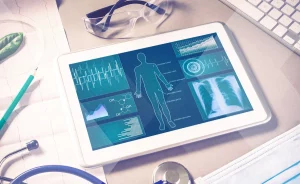Digital healthcare platforms tackle inefficiencies plaguing traditional healthcare systems. They unify patient data, streamline communication, and boost patient engagement. These digital healthcare platforms benefits transform the healthcare landscape by enhancing efficiency and accessibility. Advanced data analytics, AI-driven insights, and personalized medicine are poised to take patient care to the next level. What’s next for this rapidly evolving field?
Key Takeaways
- Digital healthcare platforms streamline patient data management, reducing administrative burdens and improving patient outcomes.
- They enhance patient engagement through personalized communication, real-time access to medical records, and virtual care options.
- Advanced data analytics and AI structure and analyze unformatted patient data, enabling informed decision-making and precise diagnoses.
- Digital healthcare platforms facilitate seamless data sharing between providers, ensuring continuous care and reducing errors.
- They integrate advanced technologies like genomics and machine learning for personalized medicine, minimizing trial-and-error approaches and improving patient outcomes.
Challenges in Traditional Healthcare
Inefficient systems and outdated practices have long plagued traditional healthcare, hindering the delivery of quality patient care. Manual data entry, paper-based records, and fragmented communication channels lead to errors, delays, and inefficiencies. These challenges result in decreased productivity, increased costs, and compromised patient outcomes. Furthermore, traditional healthcare systems often lack interoperability, making it difficult to share patient information across different providers and settings. This lack of coordination leads to duplicated efforts, misdiagnoses, and ineffective treatments.
In addition, traditional healthcare systems struggle to keep pace with the growing demand for care, resulting in long wait times, overcrowding, and burned-out healthcare professionals. The lack of transparency and accountability in these systems makes it difficult to track patient outcomes, identify areas for improvement, and make data-driven decisions. The limitations of traditional healthcare systems underscore the need for innovative solutions that can address these challenges and improve the delivery of patient care. Digital healthcare platforms benefits, such as streamlined workflows, enhanced collaboration, and real-time data analytics, offer a promising solution to these challenges.
Benefits of Digital Healthcare Platforms
The shift towards digital healthcare platforms marks a significant turning point in the delivery of patient care, as these innovative solutions offer a multitude of benefits that address the shortcomings of traditional healthcare systems. By leveraging digital healthcare platforms benefits, healthcare providers can revolutionize the way they manage patient care, leading to improved outcomes and enhanced patient experiences.
Some of the key benefits of digital healthcare platforms include:
- Enhanced Patient Engagement: Digital healthcare platforms empower patients to take a more proactive role in their care, enabling them to access their medical records, communicate with healthcare providers, and receive personalized health advice.
- Improved Care Coordination: Digital healthcare platforms facilitate seamless communication and collaboration between healthcare providers, ensuring that patients receive thorough and continuous care.
- Increased Operational Efficiency: Digital healthcare platforms automate administrative tasks, reduce paperwork, and minimize errors, freeing up healthcare providers to focus on what matters most – delivering high-quality patient care.

Streamlining Patient Data Management
Nearly 80% of healthcare data is estimated to be unstructured, comprising physician notes, medical images, and other unformatted data, making it a significant challenge for healthcare providers to manage patient data effectively. This lack of structure hinders the ability to access and utilize patient information efficiently, leading to delays in diagnosis, treatment, and care. Digital healthcare platforms benefits include providing a centralized repository for patient data, making it easily accessible and organized. These platforms utilize advanced data analytics and artificial intelligence to structure and analyze unformatted data, enabling healthcare providers to make informed decisions quickly. By streamlining patient data management, healthcare providers can reduce administrative burdens, improve patient outcomes, and enhance the overall quality of care. Additionally, digital healthcare platforms facilitate seamless data sharing between healthcare providers, ensuring that patients receive continuous and coordinated care. By leveraging these platforms, healthcare providers can overcome the challenges of managing unstructured data and provide high-quality patient care.
Enhancing Patient Engagement Experience
By providing seamless access to patient data, digital healthcare platforms set the stage for another critical aspect of patient care: enhancing the patient engagement experience. Digital healthcare platforms benefits include empowering patients to take a more active role in their care, leading to better health outcomes and increased satisfaction.
Here are three ways digital healthcare platforms enhance patient engagement:
- Personalized Communication: Digital platforms enable healthcare providers to communicate with patients in a personalized and targeted manner, addressing individual needs and concerns.
- Real-time Access to Medical Records: Patients have secure, real-time access to their medical records, allowing them to stay informed and involved in their care.
- Virtual Care Options: Digital healthcare platforms offer virtual care options, such as telemedicine and online consultations, making it easier for patients to receive care from the comfort of their own homes.
Future of Personalized Medicine
In the domain of patient care, digital healthcare platforms are poised to revolutionize the future of personalized medicine. The integration of advanced technologies, such as genomics, artificial intelligence, and machine learning, enables healthcare providers to tailor treatment plans to individual patients’ unique needs and characteristics. Digital healthcare platforms benefits include the ability to analyze vast amounts of patient data, identifying patterns and correlations that inform more precise diagnoses and treatment strategies.
Personalized medicine is no longer a concept of the future, but a reality that digital healthcare platforms are making possible. With the help of these platforms, healthcare providers can create targeted therapies, monitor patient responses, and adjust treatment plans in real-time. This approach not only improves patient outcomes but also reduces healthcare costs by minimizing trial-and-error approaches and unnecessary interventions. As digital healthcare platforms continue to evolve, we can expect to see even more innovative applications of personalized medicine, ultimately leading to better health outcomes and improved quality of life for patients.
Frequently Asked Questions
How Do Digital Healthcare Platforms Ensure Data Security and Patient Privacy?
Digital healthcare platforms guarantee data security and patient privacy through robust encryption, secure authentication, and access controls, while also adhering to stringent regulations such as HIPAA, GDPR, and CCPA, thereby safeguarding sensitive patient information.
Can Digital Healthcare Platforms Integrate With Existing Healthcare Systems?
Digital healthcare platforms can seamlessly integrate with existing healthcare systems, enabling effortless data exchange, streamlined workflows, and enhanced patient care through standardized APIs, electronic health records, and interoperability protocols.
What Kind of Training Is Required for Healthcare Professionals to Use Digital Platforms?
Healthcare professionals require thorough training on digital healthcare platforms, including hands-on experience, workshops, and online modules, to guarantee smooth integration and peak utilization of these platforms, ultimately enhancing patient care and outcomes.
How Do Digital Healthcare Platforms Handle Medical Emergencies and Urgent Care?
Digital healthcare platforms employ robust triage systems, AI-powered symptom checkers, and seamless communication channels to swiftly respond to medical emergencies and urgent care needs, ensuring timely interventions and ideal patient outcomes.
Are Digital Healthcare Platforms Accessible to Patients With Limited Technology Literacy?
Many digital healthcare platforms cater to patients with limited technology literacy by offering user-friendly interfaces, multilingual support, and accessible design, ensuring that quality care is not limited by technical proficiency, but rather inclusive and patient-centric.
Conclusion
Digital healthcare platforms are transforming the healthcare landscape by addressing traditional care’s inefficiencies. The future of patient care management lies in the strategic integration of technology, enabling healthcare providers to optimize care delivery. As the digital healthcare ecosystem continues to evolve, it is poised to revolutionize patient outcomes, driving a new era of personalized, data-driven medicine.
You May Also Like To Read:





